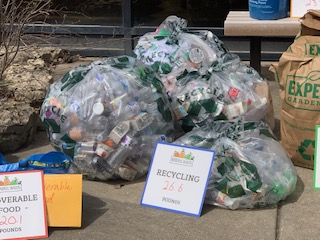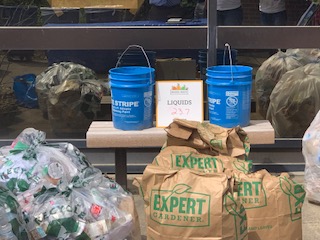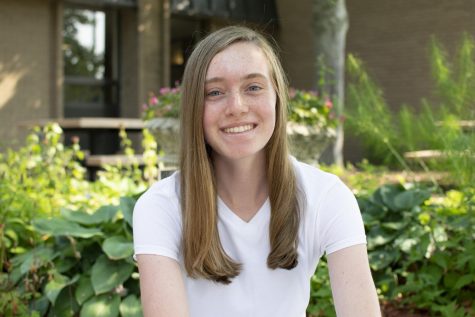Solution to end pollution
React club’s waste audit raises awareness for possible “green” cafeteria initiatives
Americans generate around 254 million pounds of landfill garbage per year, according to the EPA. But how can our very own school cafeteria help reduce this number? REACT club has it figured out.
Mindful Waste spent the day at LZHS on Earth Day, sorting cafeteria waste to determine how much the school wastes versus recycles. The company sorted waste into five different categories: recycling, landfill, recoverable foods, liquids, and compost. Using these results, the school board can approve solutions that would allow LZHS to help end pollution in a variety of ways.

Keep in mind, the following numbers are representative of just one single day in the LZHS cafeteria.
Recycling- 26.6 lbs
Around 26.6 pounds of recycling was sorted during the audit. Common mistakes students made were not rinsing out and dumping liquids from plastics, and putting candy wrappers into the recycling. Had these mistakes not been caught, the recycling would have likely been sent to a landfill instead.

Landfill- 69.9 lbs
If LZHS generates almost 70 pounds of landfill trash in just a few trashcans in a few hours, it’s no surprise that pollution is becoming a bigger and more prominent issue worldwide. A possible solution the school could employ would be to decrease the amount landfill trash sold in the cafeteria, such as candy wrappers, chip bags, and styrofoam.

Recoverable foods- 20.1 lbs
Recoverable foods refers to unopened, uneaten food thrown into the trash. Not only does this food add to landfill waste, but it also could be eaten by other students or donated to a place in need. According to Julie Gyarmaty, REACT club sponsor, the school may begin to provide a box next to trashcans for un-opened snacks, which could help reduce the amount of wasted food.

Liquids- 23.7 lbs
The school could reduce the amount of liquid getting “recycled” in plastic bottles by providing containers next to trashcans to dump liquid out into. By doing this, hopefully less plastic bottles would be recycled incorrectly, in turn decreasing the amount of landfill waste.

Compost- 54.5 lbs
Composted materials naturally decompose, breaking down to provide nourishing soil. By starting a composting program, LZHS could divert the organic waste from ending up in landfills.

As a sophomore, this is Madeleine's first year on staff and she is taking on the role of Co-Web Editor-in-Chief. Along with working for Bear Facts, Madeleine...
